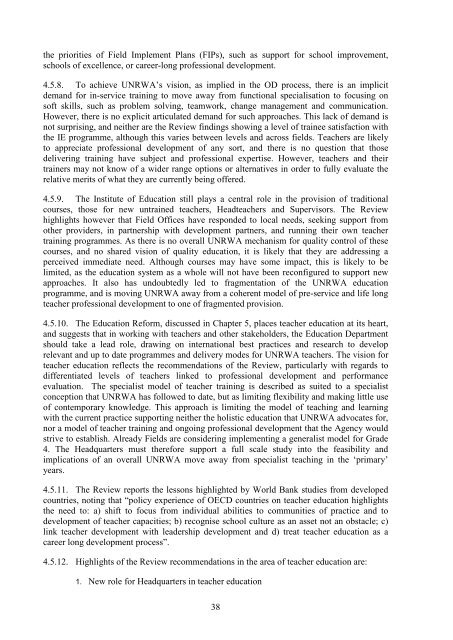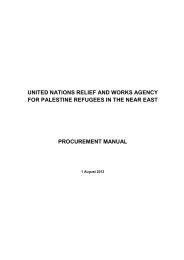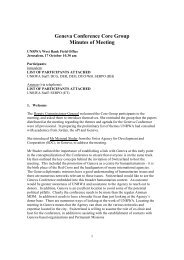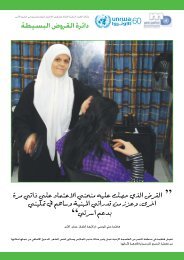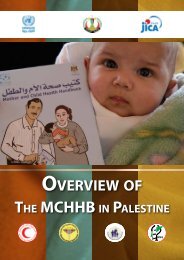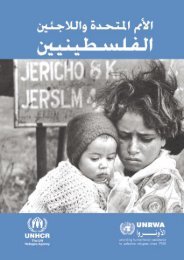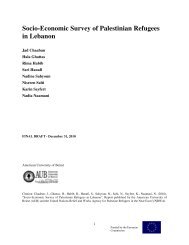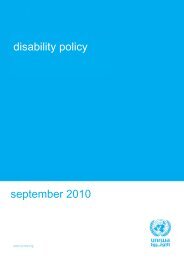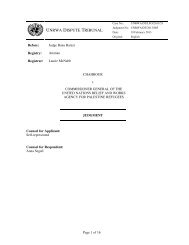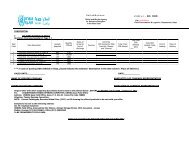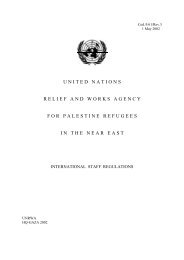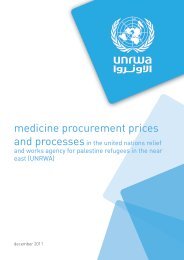Education Reform Strategy - Unrwa
Education Reform Strategy - Unrwa
Education Reform Strategy - Unrwa
Create successful ePaper yourself
Turn your PDF publications into a flip-book with our unique Google optimized e-Paper software.
the priorities of Field Implement Plans (FIPs), such as support for school improvement,<br />
schools of excellence, or career-long professional development.<br />
4.5.8. To achieve UNRWA’s vision, as implied in the OD process, there is an implicit<br />
demand for in-service training to move away from functional specialisation to focusing on<br />
soft skills, such as problem solving, teamwork, change management and communication.<br />
However, there is no explicit articulated demand for such approaches. This lack of demand is<br />
not surprising, and neither are the Review findings showing a level of trainee satisfaction with<br />
the IE programme, although this varies between levels and across fields. Teachers are likely<br />
to appreciate professional development of any sort, and there is no question that those<br />
delivering training have subject and professional expertise. However, teachers and their<br />
trainers may not know of a wider range options or alternatives in order to fully evaluate the<br />
relative merits of what they are currently being offered.<br />
4.5.9. The Institute of <strong>Education</strong> still plays a central role in the provision of traditional<br />
courses, those for new untrained teachers, Headteachers and Supervisors. The Review<br />
highlights however that Field Offices have responded to local needs, seeking support from<br />
other providers, in partnership with development partners, and running their own teacher<br />
training programmes. As there is no overall UNRWA mechanism for quality control of these<br />
courses, and no shared vision of quality education, it is likely that they are addressing a<br />
perceived immediate need. Although courses may have some impact, this is likely to be<br />
limited, as the education system as a whole will not have been reconfigured to support new<br />
approaches. It also has undoubtedly led to fragmentation of the UNRWA education<br />
programme, and is moving UNRWA away from a coherent model of pre-service and life long<br />
teacher professional development to one of fragmented provision.<br />
4.5.10. The <strong>Education</strong> <strong>Reform</strong>, discussed in Chapter 5, places teacher education at its heart,<br />
and suggests that in working with teachers and other stakeholders, the <strong>Education</strong> Department<br />
should take a lead role, drawing on international best practices and research to develop<br />
relevant and up to date programmes and delivery modes for UNRWA teachers. The vision for<br />
teacher education reflects the recommendations of the Review, particularly with regards to<br />
differentiated levels of teachers linked to professional development and performance<br />
evaluation. The specialist model of teacher training is described as suited to a specialist<br />
conception that UNRWA has followed to date, but as limiting flexibility and making little use<br />
of contemporary knowledge. This approach is limiting the model of teaching and learning<br />
with the current practice supporting neither the holistic education that UNRWA advocates for,<br />
nor a model of teacher training and ongoing professional development that the Agency would<br />
strive to establish. Already Fields are considering implementing a generalist model for Grade<br />
4. The Headquarters must therefore support a full scale study into the feasibility and<br />
implications of an overall UNRWA move away from specialist teaching in the ‘primary’<br />
years.<br />
4.5.11. The Review reports the lessons highlighted by World Bank studies from developed<br />
countries, noting that “policy experience of OECD countries on teacher education highlights<br />
the need to: a) shift to focus from individual abilities to communities of practice and to<br />
development of teacher capacities; b) recognise school culture as an asset not an obstacle; c)<br />
link teacher development with leadership development and d) treat teacher education as a<br />
career long development process”.<br />
4.5.12. Highlights of the Review recommendations in the area of teacher education are:<br />
1. New role for Headquarters in teacher education<br />
38


